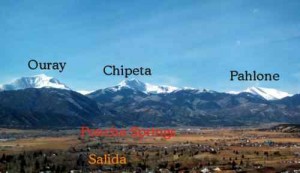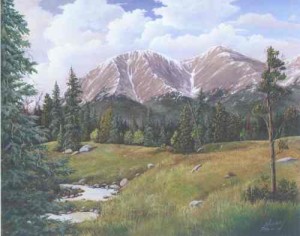Essay by Colin Calloway
History – December 2004 – Colorado Central Magazine
IF AMERICAN HISTORY west of the Mississippi begins with Lewis and Clark, then the history of the United States seems pretty simple: “Indians owned the West, and then they lost it.”
History is never so simple. That some of the people Lewis and Clark met had “never seen a white man” did not mean they had not seen change.
Lewis and Clark saw a snapshot of time and place. It was a landscape that had evolved over millions of years, and an environment that had been shaped by Indian and animal life for thousands of years. By the time the explorers headed out from St. Louis in 1804, many of the people who had previously inhabited the West were gone.
Some had died only a couple of years before, from epidemics of smallpox. Others had been gone for centuries, and places like Mesa Verde and Cahokia, an ancient city of 30,000 near the site of present-day St. Louis, were long silent. In other places, Indian inhabitants remained where they had lived from time beyond memory; it was the Spanish, French and English, who had competed for their trade or their souls, who had come and gone.
Long before the West became a part of “America,” Indians and Europeans who had lived together for generations produced mixed communities and people of mixed descent. The Osages remembered seeing the first visitors called Americans on the left bank of the Mississippi, “chopping trees and building and plowing and swearing.” They had hair on their faces like French voyageurs, “and soon the Little Ones were calling them Heavy Eyebrows as well, but knowing them to be Long Knives.”
Jefferson did little to allay Osage apprehensions. He told Osage and other delegates in Washington in 1806 that the United States had peaceful intentions, but “we are strong, we are numerous as the stars in the heaven, and we are all gun-men.”
If Lewis and Clark brought the promise of a new power in the West, Indian people at first saw little to suggest that these newcomers would last any longer than those who had come before. But historian James Ronda notes that when Lewis and Clark arrived on the Pacific Coast in December 1805, they came at the wrong time and from the wrong direction: Native peoples were accustomed to trading with traders from the sea in the spring and fall.
Another difference was the way Lewis and Clark’s exploration reshaped our concept of time. Millennia became concentrated into one pre-American time frame, and with it a nation’s sense of its ancient experiences was lost. Did the people who inhabited Cahokia for 700 years think there would be a time when Cahokia no longer existed? Did the Anasazi and Hohokam of the Southwest know that their irrigation systems would fail? Could the people who lived for thousands of years on buffalo or salmon have imagined that the source of their life could become polluted, or disappear entirely?
AMERICAN OCCUPATION of the West occurred in the blink of an eye, historically speaking. In the late 19th century, buffalo were exterminated to make way for cattle, Indians were dispossessed to make way for ranchers and farmers. At the end of the 20th century, buffalo started returning, and the cattle industry struggled to survive. Farming communities on the Northern Plains experienced population decline, while Indian populations in reservation communities increased to reach pre-contact levels.
At the beginning of the 21st century, the American West has an economy and a way of life that depend on oil and water. But gauged against the span of human history in the West, this way of life is still a baby, and chances of it surviving infancy may not be good. In the end, automobiles and oil may not be that different from horses and buffalo.
Charting the creation and subsequent decline of both Cheyenne and settler society in 19th-century Colorado, historian Elliott West says simply: “Everything passes, no one escapes.” But this is a lesson lost in American history if we look on the Lewis and Clark expedition as an opening chapter in a story of progress, a story that, because it is our story, we assume will be different from everybody else’s.
It won’t. The cycles of history will continue as they always have; perhaps the only truly exceptional thing about American history will be that it happened in America.
Colin Calloway is a contributor to Writers on the Range, a service of High Country News in Paonia (www.hcn.org). He is professor of history and chair of Native American Studies at Dartmouth College.


